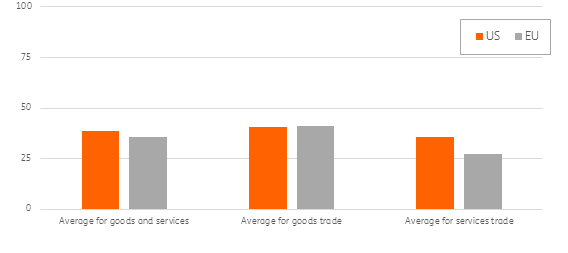TTIP 2.0: A solution to the US-EU trade conflict
President Trump is about to unleash a trade war with the European Union if the EU does not meet his demand to take unilateral measures to lower the US trade deficit with the EU. The EU says it won't comply and has instead prepared a list of retaliatory measures. Both parties would be better off if they decide to resume the TTIP negotiations
The benefits of resuming TTIP
At the end of April President Donald Trump demanded trade concessions from the EU by the first of June, at the pain of raising tariffs on EU steel and aluminium. Countries such as South Korea have already yielded to the same blackmail tactics from the US government. Canada and Mexico are also prepared to make concessions in the ongoing NAFTA re-renegotiations and even China has made some concessions.
Trump's blackmail strategy won't work with the EU
But the EU has held firm and asked the US to remove the threat of steel and aluminium tariffs before talking about changing the trade conditions. The EU is in a better position to issue this demand than other countries. South Korea, Canada, Mexico and even China are more dependent on US demand for their products than the other way round. In contrast, the US economy depends almost as much on European demand trade for its products than vice versa. A transatlantic trade war would lead to a lose-lose situation for both the US and the EU.
Resuming the TTIP (Transatlantic Trade and Investment Partnership) negotiations, on the other hand, would bring benefits to both trade giants.
A free trade agreement is not only superior to the current strategy of Trump because he has difficulties strongarming the EU, so it would avoid a mutual harmful trade war, but also because such an agreement would result in larger benefits for the US then unilateral EU- concessions. After all, if the EU would give in to the US and reduce an import tariff unilaterally, for example on cars, WTO rules dictate that it needs to offer the lower tariff to all its trade partners. So all imported cars would become cheaper – including the very competitive ones from Japan, South Korea and China. This would act as a brake on any increase in American car exports to the EU.
Doing this will require quite some resistance to be overcome. TTIP was put on ice in late 2016 after activists in Europe had undermined support for the deal. On the other side of the Atlantic too, the political support for a deal had disappeared amid the apparent popularity of Trump’s protectionist campaign messages.
Non-tariff measures US and EU (simple average)

What the EU should be doing
In light of President Trump’s preoccupation with the car industry, the EU should try to lure the US to the negotiating table with an offer to reduce EU import tariffs on cars to equal the US’s 2.5%. That would enable President Trump to claim a victory at home. In return the EU could require that its standards on crash testing cars are accepted in the US, saving a second round of checks. Once at the negotiating table, the EU could be seeking to reduce the high non-tariff trade barriers on other products too, such as lipstick.
The US benefits more from a trade deal than ad hoc trade concessions
For TTIP negotiations to resume, support will need to be rebuilt in both the US the EU. To assist in this, contentious issues such as chlorinated chicken, blue cheese and a mechanism to settle disputes between foreign investors and domestic governments, might have to be set aside. This would result in a TTIP 2.0. To build support, the tainted TTIP acronym should also be discarded.
Whatever it takes, a broad trade agreement between the US and EU is the best answer to the current trade conflict.
Download
Download article18 May 2018
In Case You Missed It: Testing times This bundle contains {bundle_entries}{/bundle_entries} articles"THINK Outside" is a collection of specially commissioned content from third-party sources, such as economic think-tanks and academic institutions, that ING deems reliable and from non-research departments within ING. ING Bank N.V. ("ING") uses these sources to expand the range of opinions you can find on the THINK website. Some of these sources are not the property of or managed by ING, and therefore ING cannot always guarantee the correctness, completeness, actuality and quality of such sources, nor the availability at any given time of the data and information provided, and ING cannot accept any liability in this respect, insofar as this is permissible pursuant to the applicable laws and regulations.
This publication does not necessarily reflect the ING house view. This publication has been prepared solely for information purposes without regard to any particular user's investment objectives, financial situation, or means. The information in the publication is not an investment recommendation and it is not investment, legal or tax advice or an offer or solicitation to purchase or sell any financial instrument. Reasonable care has been taken to ensure that this publication is not untrue or misleading when published, but ING does not represent that it is accurate or complete. ING does not accept any liability for any direct, indirect or consequential loss arising from any use of this publication. Unless otherwise stated, any views, forecasts, or estimates are solely those of the author(s), as of the date of the publication and are subject to change without notice.
The distribution of this publication may be restricted by law or regulation in different jurisdictions and persons into whose possession this publication comes should inform themselves about, and observe, such restrictions.
Copyright and database rights protection exists in this report and it may not be reproduced, distributed or published by any person for any purpose without the prior express consent of ING. All rights are reserved.
ING Bank N.V. is authorised by the Dutch Central Bank and supervised by the European Central Bank (ECB), the Dutch Central Bank (DNB) and the Dutch Authority for the Financial Markets (AFM). ING Bank N.V. is incorporated in the Netherlands (Trade Register no. 33031431 Amsterdam).
